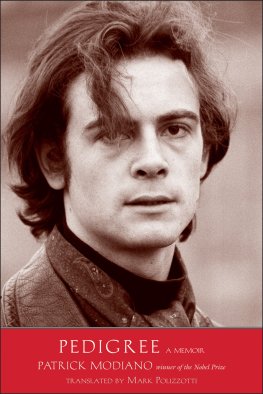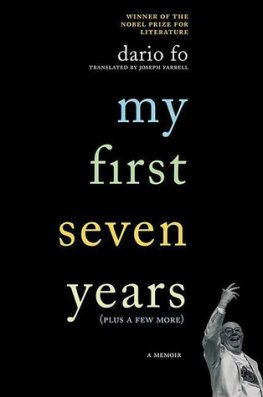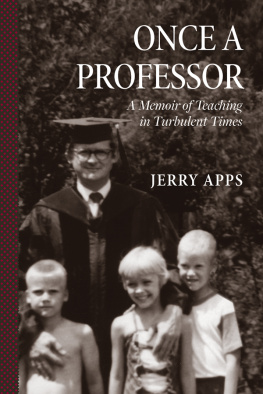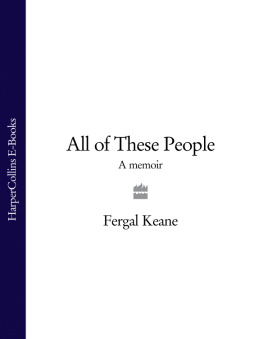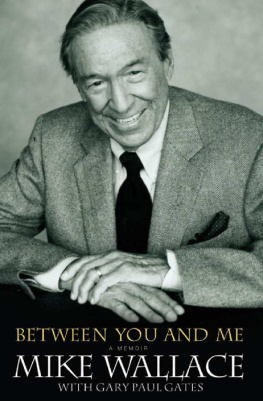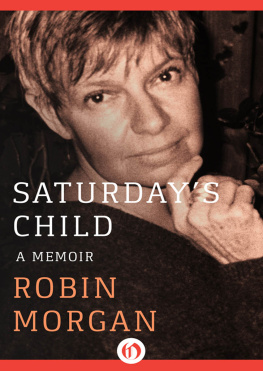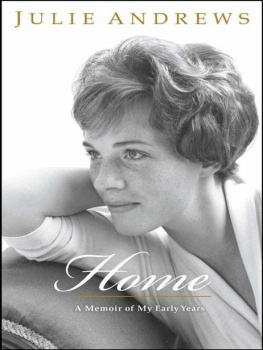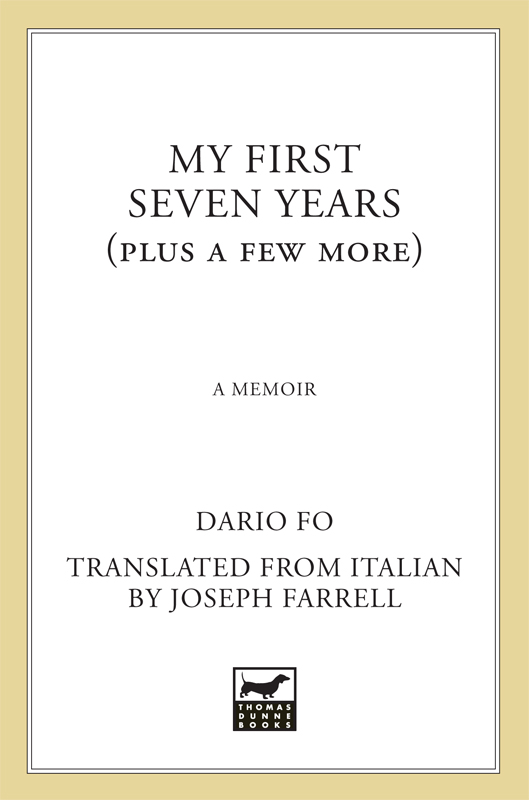
The author and publisher have provided this e-book to you for your personal use only. You may not make this e-book publicly available in any way. Copyright infringement is against the law. If you believe the copy of this e-book you are reading infringes on the authors copyright, please notify the publisher at: us.macmillanusa.com/piracy.
Contents
PROLOGUE
What I propose to tell is not the story of my life as an actor, author and director, but rather a fragment of my childhood. To be more exact, only the early part of it: the prologue to my adventure, starting from the time when it would never have entered my head that I would end up plying my trade as a performer.
I remember Bruno Bettelheim, author of a revolutionary theory on the formation of the character and intellect of the individual, saying: All I ask is that you give me the first seven years of the life of a man. Its all there; you can keep the rest.
I have gone over the score a bit: I am offering you ten, plus a couple of pointers towards the years of my maturity take my word for it, its already too much!
CHAPTER 1
The Discovery that God is also supreme head of the Italian State Railway
Everything depends on where you are born, a wise man once said. I have to say that in my case he got it absolutely right.
First of all, I have to say thank you to my mother, who chose to give birth to me in San Giano, on the shores of Lake Maggiore. Odd metamorphosis of a name: double-faced Janus, or Giano, one of the gods of ancient Rome, transformed into a completely invented Christian saint who was, into the bargain, the alleged protector of the fabulatores-comicos. To be truthful, the choice was made not by my mother but by the Italian State Railway, who decided to dispatch my father to perform his duties in that station. Yes, my father was station-master, even if he was not a native of the place. The San Giano stop was of such negligible importance that all too often engine drivers swept by without so much as noticing. One day a traveller, tired of having to get off at the next station, pulled the emergency cord. It took some time for the brakes to engage, and the train drew up right in the middle of a tunnel. A goods train coming behind ploughed into the back of the stationary train. Miraculously, there were no casualties, and only one serious injury to the passenger who pulled the emergency cord. The wretched man had the misfortune to be severely beaten up by all the other occupants of the carriage, including a nun.
With the arrival of my father, everything at San Giano station changed utterly. Felice Fo was the sort of man who commanded respect and deference. When he took his stance on the railway line, erect and upright, red bonnet just above the eyeline, clutching the matching red flag, every single train, whether grand express train or local puffer, of which there were four a day, drew to halt.
I came into the world in that subsidiary stop four steps from the lake ( Ante-lacus, in the words written on a Roman tablet), between a local train and a goods train. It was seven oclock in the morning when I made up my mind to peep out from between my mothers legs. The woman who acted as midwife hauled me out, held me up by the feet like a chicken, then, very swiftly, gave me a great slap on the buttocks and I squealed like an alarm call. At that very moment, the six-thirty passed by a couple of minutes late, obviously. My mother always swore that my first howl was far louder than the whistle of the locomotive.
So, I first saw the light at San Giano solely by decision of the Italian State Railway company, but that was my place of birth only in the eyes of the Registry of Births, Marriages and Deaths.
In my own eyes, I came into the world and came to awareness some thirty or forty kilometres further north along the lake, at Pino Tronzano, and then some years later at Porto Valtravaglia, on the narrow strip of land flanking Lake Maggiore. Both of these were my wonderlands, the places which unleashed my wildest fantasies and determined every future choice I would make. The various moves were made courtesy of the executive of the Italian State Railway, Milan division.
Milan! I remember going there for the first time with my father. I was very young and he was there to take some exam or other in rail traffic control in the hope of being promoted to station-master, second class, category C. So why did he bring along a child of my age? I have always suspected that he took me with him as a magic charm. Everybody in the family was convinced that I brought boundless good luck. As it happens, I was born in a shirt, as the saying went, that is, I emerged wrapped up in my mothers placenta, a harbinger of good fortune according to the age-old traditions of the lakelands.
When we got to Milan, shortly before entering the great hangar of the Stazione Centrale, the train slowed down to walking pace. Pap Felice Pa Fo, as my mother called him rolled down the window and made me lean head and shoulders out. Look up there, he said, pointing to an overhead bridge on steel girders, under which all the trains had to pass. I saw a huge walkway crammed with lights trained in all directions, and a series of glass cabins lit up by bright, coloured lamps. The whole amazing structure was supported by giant pylons.
What is it?
Its the operational headquarters that controls the movement of all trains, as well as the points and the signals.
At that moment, I was convinced: that glass cabin with its shining lights must be the abode of God and all the saints of station-masters. I had no doubt: our Heavenly Father was none other than the Director General of the Italian State Railway company. It was He who oversaw the placement of railway-men and the movement of trains, He who planned the engines and the birth of station-masters children!
But let us go back to the first move from San Giano to the station at Pino Tronzano, on the Swiss border. All the family furniture was loaded onto a goods wagon for a journey which was no more than an hour and a half. I was overwhelmed by the sight of the beds and cupboards being dismantled and, believing they were being broken apart, I burst into tears of despair. My father did all he could to reassure me: As soon as we get there, well put everything back together in no time, youll see.
Alas, as our things were being loaded, the cast-iron stove tumbled off the carriage and smashed to pieces, causing my mother to let out a dreadful scream. I took her hand and to comfort her said: Dont worry, as soon as we get there, Pap will stick it back together. Ah, the good old trust in fathers!
The coach was attached to the train and we all clambered aboard. When we got to Pino Tronzano, our goods carriage was detached and, with the help of two porters, my father and mother started to unload the parts that had to be reassembled.
I was literally fascinated by that place: the station was bigger than the one where I had been born. We lived above the station, on the first floor, and the lake lay a hundred metres away, down a steep slope. Behind us, a rocky wall with a zigzagging road cut into the cliff and climbed up to a village of fifty or so houses piled one on top of the other, as in a Romanesque bas-relief. The village contained an ancient tower, a belfry standing over the church and a large palace which housed the town hall, the school and the medical centre.
My parents and the porters were still at work when the priest turned up to welcome us and bless each of the rooms and freshly plastered walls of the house. He came accompanied by an altar boy with hair as red as his soutane, and after the due benedictions, the altar boy led me off to an open space behind the station to inspect a big compound, in the middle of which stood a massive hen run, shaped like a pavilion and packed with cockerels and hens who greeted us with festive din. Behind the pavilion, there was a row of cages which seemed to be jumping with the endless scurrying of rabbits crammed into a kind of cloister.


